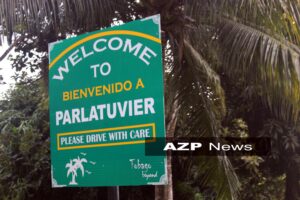
ANDREA Bharatt’s funeral last Friday, was heart breaking.
As we continue this critical struggle to better protect our women and girls, comes word from Prime Minister Dr Keith Rowley that the attorney general will be bringing legislation in the coming weeks to legalise pepper spray, using a permit system.
No details on what would be the criteria for the permit system, were released. But based on my research, given the terrible reality of daily assaults and violence faced by Trinidad and Tobago women, a permit system for pepper spray will make for bad law. Here’s why.

Pepper spray is an aerosol spray containing an inflammatory chemical, called capsaicin (that’s the chemical that makes peppers hot). If sprayed in the eyes, it causes burning, tears and pain, which stops whatever activity the peppered person was engaging in. Many places around the world allow its use as a non-lethal method for policing, crowd control and self-defence. In this country, it’s illegal.
Many, including myself, have called for its long over-due legalisation here.
Countries that have introduced a permit system for pepper sprays appear to be few. The vast majority who have legalised it, prefer to regularise the spray.

A permit system effectively limits access to the spray. Regularising pepper spray, on the other hand, usually makes it available to everyone, but with controls.
My research indicates that countries who use a permit system, make it available only to persons such as these:
- Civilians whose work involves defensive purposes e.g. private security guards;
- The police; and
- People with a documented history of threats and/or stalking against them.
Countries that make pepper spray freely available, usually introduces reasonable controls, such as these:
- The makeup of the pepper spray is strictly controlled and may need certification e.g. the capsaicin concentration level must not exceed 10%;
- The canister size may be limited to e.g. two ounces or only two bottles per person;
- Criminalising the actions of civilians who uses pepper spray for a reason other than self-defence e.g. to commit a crime.
How is a permit system supposed to protect women who will lose their lives the way Andrea Bharatt and Ashanti Riley did? Andrea Bharatt and Ashanti Riley had no history of stalking or threats! They had no warning, no notice. Out of the blue, they were kidnapped, assaulted and killed!
It seems to me that if the attorney general seeks to introduce legislation which limits the availability of pepper spray to only specific categories on persons, those laws will be flawed from the outset. Not to mention the likely red tape that will be involved in getting a permit.
Giving permits to a limited category of persons will not achieve the objectives of the #protectwomenlives movement. All women must be protected! Not just the ones who are already the victims of crime, or who work as private security.
There’s a saying: “When the people talk, listen completely.” Thus far, it seems the government is not hearing the people completely on the issue of pepper spray. They want all women protected, not a select few.
Introducing reasonable controls on the use of pepper spray seems fine, as is penalising those who use it for purposes other than self-defence. But make it available to all, without a permit. Be safe Trinidad and Tobago.
Copyright © 2021 Neela Ramsundar, LL.B (HONS), L.E.C is a Civil Litigation Attorney at Law & Certified Mediator.
Disclaimer: The contents of this article are for general informative purposes only. It does not provide legal advice and does not create an attorney-client relationship with any reader. For legal advice on your specific situation, please contact an Attorney-at-Law of your choosing directly. Liability for any loss or damage of any kind whatsoever allegedly incurred a consequence of using content in this article is thus hereby excluded to the fullest extent permitted by law.
![]()












